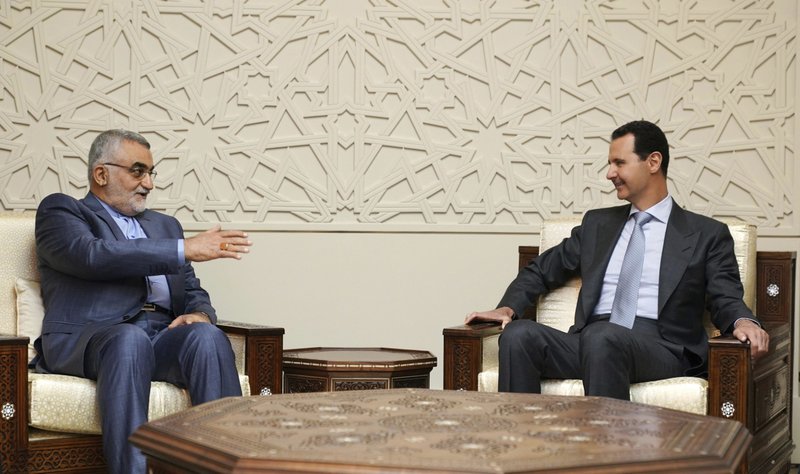A missile attack on government outposts in northern Syria killed more than a dozen pro-government fighters, many of them Iranians, a war monitoring group and an Iranian news agency said Monday.
The strikes came amid soaring tensions between regional archenemies Israel and Iran.
There was no official confirmation of the death toll or what was the target. The Sunday night strikes sparked speculation on who carried it out, with most reports suspecting Israel was behind it.
Syrian state TV called it a "new aggression on military positions" in Hama and Aleppo provinces but was not specific.
Activists said there was an explosion at an arms depot and military compounds where Iranian fighters are based.
The explosion was large enough to be picked up by monitors as a magnitude-2.6 earthquake.
The Syrian Observatory for Human Rights said 26 pro-government fighters were killed, most of them Iranians, with only four Syrians among the dead.
It said the arms depot contained surface-to-surface missiles belonging to Iranian militias in Hama province. Another attack hit near a military air base in Aleppo province, the Observatory said.
It added that the death toll could rise, since 60 fighters were wounded and several others remained missing.
A member of an Iranian-backed Iraqi militia operating in Syria confirmed the attack on the Hama facility and put the death toll at 36, including 10 Iranian advisers. The official spoke on condition of anonymity because he was not authorized to talk to the media.
Iranian media gave conflicting reports: One semiofficial news agency said there were no Iranians killed, while a second one said 18 were killed.
The arms depot in Hama, known as Brigade 47, is one of the largest bases housing Iranian-affiliated forces and equipment, according to Jamil al-Saleh, commander in the opposition Tajammu al-Ezzat rebel group.
He said the province has at least five other bases where Iranians are deployed alongside Syrian- allied militias.
The two airstrikes were near rebel areas, he added.
"It was like an earthquake hit Hama," al-Saleh said by telephone from Hama province. He and the Observatory said they suspect Israel was behind the attack.
Lebanon's Al-Akhbar newspaper, considered close to the militant Iranian-backed Hezbollah group and the Syrian government, said the attack targeted "important arms depots used by the [Syrian] army and Iran's Revolutionary Guards."
It said the missiles used appear to have been bunker busters.
Syria-based opposition media activist Mohamad Rasheed said the base that came under attack is about 7 miles outside the city of Hama, adding that the airstrike led to several explosions in the arms depot. He added that the area is known as the Maarin Mountain or Mountain 47.
Some of the exploding missiles in the arms depot struck parts of Hama, Rasheed said, adding that residents near the base fled their homes.
He said the base has been run by Iranian and Iran-backed fighters from Lebanon, Iraq, Afghanistan and Pakistan.
Tehran has sent thousands of fighters to Syria to support President Bashar Assad's forces in the seven-year civil war.
After the attacks, Iran's Supreme Leader Ayatollah Ali Khamenei said the time when Tehran's enemies can "hit and run" is over, although he did not specifically refer to Sunday night's strikes.
"They know if they enter military conflict with Iran, they will be hit multiple times," he said in comments at a meeting with workers, according to his website.
There was no immediate comment from Israel, which rarely confirms or denies its attacks.
Iranian state TV reported the attack, citing Syrian media.
The semiofficial Iranian news agency Tasnim, believed to be close to the Revolutionary Guard, denied any Iranian fighters were killed or that Iranian-run bases were hit.
It quoted an unidentified Iranian informed official in its report but did not elaborate.
The semiofficial Iranian Students News Agency said the strike killed 18 Iranians, including a commander, in a suburb of the central city of Hama. It cited "local sources and activists." It said the missiles targeted buildings and centers that likely included a weapons depot.
The Syrian government-owned Tishrin newspaper quoted what it called "sources on the ground" as saying that the attack in Aleppo and Hama provinces consisted of nine ballistic missiles fired from U.S.-British bases in northern Jordan. The report could not be independently confirmed.
A member of one of the Iranian-backed militias posted on Facebook that the strikes have "hit our bases" where "allies" are also present. Kamal Fayyadh, a Lebanese living in Syria, didn't elaborate but said Israel was suspected of being behind the attack.
Former Israeli military intelligence chief Amos Yadlin, who heads Tel Aviv University's Institute for National Security Studies, said Iran's robust military presence in Syria and Israel's determination to prevent it have put the two on a collision course at a time of tensions over the nuclear deal, Palestinian protests in Gaza and the expected U.S. Embassy move to Jerusalem.
Tensions between Iran and Israel were running high following an airstrike earlier this month on Syria's T4 air base in Homs province that killed seven Iranian military personnel. Tehran has vowed to retaliate for that attack.
Syria, Iran and Russia blamed Israel for that attack. Israel did not confirm or deny it.
Israel Defense Minister Avigdor Lieberman said in an interview published Thursday that his country will strike Iran if it attacks.
Information for this article was contributed by Nasser Karimi, Ilan Ben Zion and Qassim Abdul-Zahra of The Associated Press.
A Section on 05/01/2018
